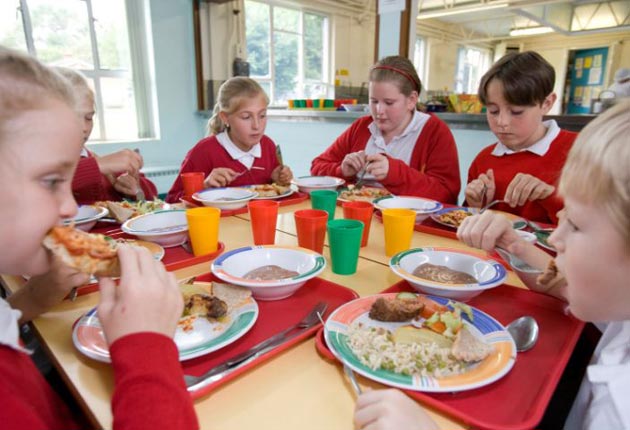How do you make children eat healthily? Lock them in
School meals tsar wants children kept away from fast-food outlets

Your support helps us to tell the story
From reproductive rights to climate change to Big Tech, The Independent is on the ground when the story is developing. Whether it's investigating the financials of Elon Musk's pro-Trump PAC or producing our latest documentary, 'The A Word', which shines a light on the American women fighting for reproductive rights, we know how important it is to parse out the facts from the messaging.
At such a critical moment in US history, we need reporters on the ground. Your donation allows us to keep sending journalists to speak to both sides of the story.
The Independent is trusted by Americans across the entire political spectrum. And unlike many other quality news outlets, we choose not to lock Americans out of our reporting and analysis with paywalls. We believe quality journalism should be available to everyone, paid for by those who can afford it.
Your support makes all the difference.The newly appointed school food tsar will today urge headteachers to bar pupils from leaving the premises at lunchtime in an effort to promote healthy eating habits.
Rob Rees, a former chef who now runs a private cookery school and his own food consultancy, has taken over from the television cook Prue Leith as chairman of the School Food Trust, which was set up by the Government to promote healthy school dinners.
In his first interview since taking office, he said: "I would like headteachers to have a policy of no one being offsite during lunchtime. Schools that have done this have found improvements in behaviour in the afternoon."
He said that schools unwilling to lock up pupils at lunchtime should at least demand that local fast-food outlets provide healthier fare.
"If you're going to let them off site, at least negotiate with the local chippie not to put salt cellars out for them," he said. "That tiny thing can make a difference. There's enough salt in the fish and chips anyway." Mr Rees said he thought parents would back the ban: "If their kids get a good nutritional meal at lunchtime, they might not have to make such a big effort during the evening. They do not need a big tea."
Mr Rees, 41, who started as a trainee chef at Le Gavroche restaurant, also urged schools to look to buy in good local produce rather than pre-packed food, and said they should treat pupils as "customers" – and entice them into eating school dinners by providing them with better meals. "After all, in secondary schools, if they are allowed out at lunchtime, they can take their money elsewhere," he added.
Chris Davies, of the National Primary Headteachers' Association, criticised Mr Rees's proposal. "Most headteachers are already in favour of improving pupils' nutrition and diet but shutting the school gates in order to achieve that is a step too far," he said.
"Preventing pupils from leaving the premises is a less imaginative strategy. It is difficult to enforce, puts further pressure on staff and it is likely to lead to disgruntled parents and children complaining about their civil rights.
"One school in Ryde on the Isle of Wight has significantly reduced its lunchtime thus allowing less time for pupils to be offsite. That feels like a more appropriate strategy than an all-out ban."
He added: "A focus on health and exercise permeates most parts of school life. Thatcher did away with the demand on schools to monitor nutrition of school meals – but much of that has been reinstated now."
The School Food Trust is encouraging the setting-up of school food panels, where pupils can discuss their ideas about school lunches. Mr Rees believes the school cook should also be included on the panel to take in pupils' views and evaluate how practical they are.
Mr Rees also runs a charity for pupils excluded from school, trying to engage them with learning by adopting a healthier living style. "One youngster had drunk two one-litre bottles of some cheap energy drink by the time he arrived," he said. "You can't say: 'If you go on like this, in 15 years you're going to be obese.' That doesn't matter to them. It's a lifetime away. You have to give them reasons for not doing it tomorrow and say: 'You'll feel better.' That's what good food education is about."
Join our commenting forum
Join thought-provoking conversations, follow other Independent readers and see their replies
Comments